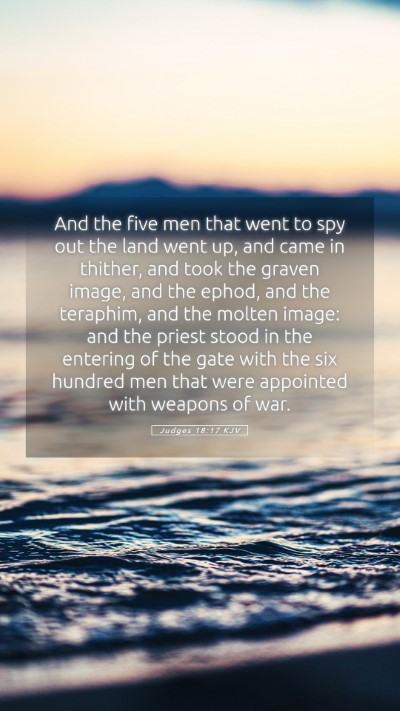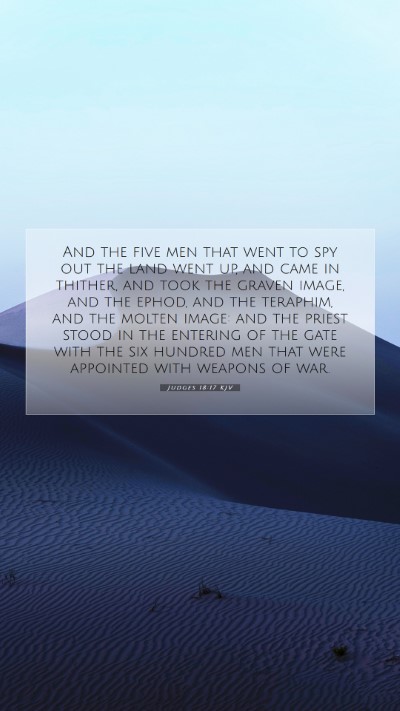Bible Verse Commentary on Judges 18:17
Judges 18:17 (KJV): "And the five men that went to spy out the land went up, and came in, and took the graven image, and the ephod, and the teraphim, and the molten image: and the priest stood in the entering of the gate with the six hundred men that were armed with weapons of war."
Understanding Scripture: Overview and Context
This verse sits within the broader narrative of the Judges, a period characterized by Israel's cyclical rebellion against God followed by oppression and deliverance. The specific context of Judges 18 recounts the migration of the Danites as they searched for a territory to settle. Their encounter with Micah, who had established a shrine with idols worship, illustrates the spiritual decline of Israel during this time.
Verse Breakdown and Analysis
- The Five Men: These men were part of the tribe of Dan, sent to scout for a suitable place for settlement. This act reflects their discontent and search for identity.
- The Graven Image: By taking the idol, the Danites exemplify the syncretism prevalent among the tribes of Israel, merging Canaanite worship practices with the worship of Yahweh.
- The Ephod and Teraphim: The ephod was a priestly garment, and teraphim were household idols representing a perverse form of worship. The choice to usurp these items signifies the corruption of religious practices in Israel.
- The Priest's Role: The priest stands at the gate, facilitating the actions of the Danites. His presence symbolizes a disturbing endorsement of idolatry within Israel's religious leadership.
- The Armed Men: The six hundred men represent the might and readiness of the tribe of Dan; however, they march towards a path of apostasy rather than divine guidance.
Public Domain Commentary Insights
Commentators like Matthew Henry reflect on the tragic consequence of idolatry and the abandoning of true worship in the context of Israel's spiritual decline. He notes that Micah's unauthorized worship reflects the abandonment of God's true services and encourages both moral and spiritual chaos.
Additionally, Albert Barnes emphasizes the grievousness of the theft. He points out that the Danites' actions highlight their disregard for God's commandments regarding idolatry, underscoring the importance of worship centered on God alone.
Adam Clarke provides a broader lens, noting the historical and cultural implications of the Danites' choice to prioritize their desires above divine law. This reflects the continuing themes of disobedience and the pursuit of personal gain at the expense of covenant fidelity.
Application of Judges 18:17 in Today's Context
This passage encourages readers to reflect on their spiritual practices and the influences that guide them. The temptation of syncretism—combining secular practices with sacred beliefs—is a pertinent issue in contemporary faith communities. The verse serves as a warning against compromising one's devotion to God.
Related Bible Cross References
- Exodus 20:4-5: The prohibition of idols and graven images.
- Judges 17:5: The establishment of a private shrine by Micah.
- 1 Samuel 15:23: The consequences of rebellion against God's commands.
Conclusion
Judges 18:17 encapsulates a key moment in the narrative of Israel's decline, marked by spiritual unfaithfulness. By examining this verse and its implications, believers today can deepen their Bible study insights and strive for a more authentic expression of faith grounded in obedience to God.


